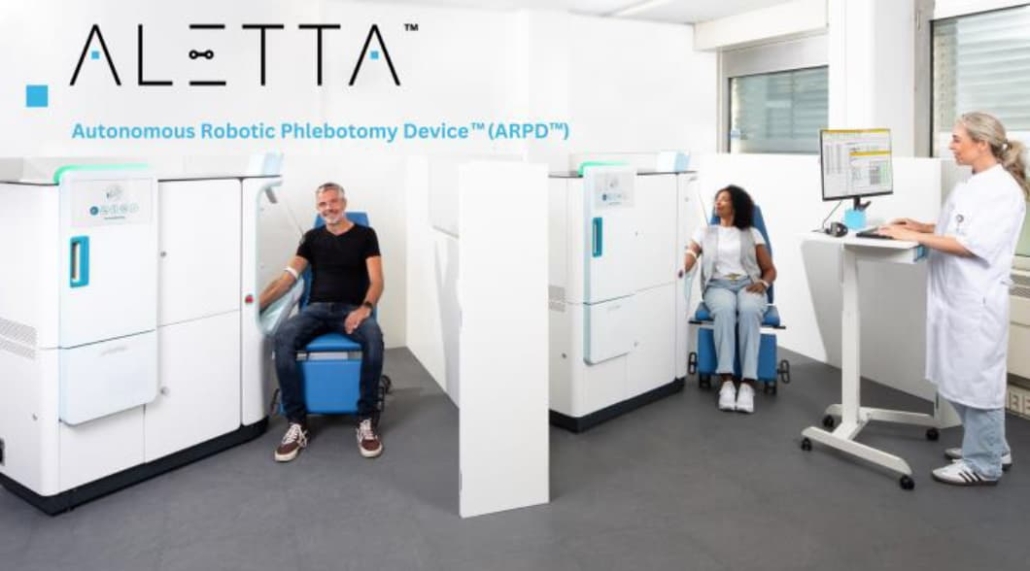Robotic blood collection: Northwestern Medicine and Vitestro pioneer autonomous phlebotomy
Northwestern Medicine and Netherlands-based Vitestro have initiated a groundbreaking collaboration to validate the world’s first autonomous robotic phlebotomy device. The multi-centre clinical trial aims to address critical workforce shortages in laboratory medicine while improving sample quality, enhancing operational efficiency, and transforming the patient experience through advanced robotic technology.
Automation addresses critical gap in laboratory workflow
The collaboration between Northwestern Medicine and Vitestro marks a significant advancement in medical robotics and laboratory automation. The partnership centres on validating Vitestro’s Aletta™ – the world’s first Autonomous Robotic Phlebotomy Device™ (ARPD™) – in a multi-centre clinical trial designed to generate essential evidence for the adoption of automated phlebotomy in US healthcare settings.
Phlebotomy – the collection of blood samples for diagnostic testing – remains one of the few manual processes in modern laboratory medicine. With healthcare systems worldwide facing critical staffing shortages, particularly in laboratory services, this innovation addresses an urgent need for sustainable solutions that maintain quality and accessibility of diagnostic testing.
“Phlebotomy remains one of the last manual processes in laboratory medicine, and automation presents a pivotal opportunity to transform it,” said Gregory S. Retzinger, MD, PhD, Medical Director of Pathology Clinical Services at Northwestern Memorial Hospital. “This collaboration goes beyond evaluating autonomous robotic phlebotomy – it has the potential to solve urgent staffing challenges and redefine the future of laboratory medicine.”
Technological foundation and clinical validation
The Aletta system integrates advanced robotics, artificial intelligence, and imaging technology to execute venipuncture procedures with precision. While the device has already received CE marking in Europe, indicating compliance with EU safety and performance standards, it has not yet received FDA approval for use in the United States.
The clinical trial at Northwestern Medicine will evaluate both performance and safety metrics, with particular focus on first-attempt success rates, patient comfort, sample quality, and operational efficiency. The data generated will be critical for regulatory submission and adoption across US healthcare systems.
Northwestern Medicine represents an ideal clinical partner for this validation work, as one of only three hospitals in the United States to receive a US News rating of High Performing in all procedures and conditions, with Northwestern Memorial Hospital named to the Best Hospital Honor Roll for 13 consecutive years.
Addressing multiple healthcare challenges
The collaboration aims to tackle several interconnected challenges facing laboratory medicine:
Workforce sustainability
Healthcare systems worldwide face critical shortages of qualified phlebotomists and laboratory personnel. Automation offers a scalable solution that can maintain service levels despite staffing constraints.
“At Northwestern Medicine, we are dedicated to pioneering innovations that elevate patient care and operational excellence,” said Gary A. Noskin, MD, senior vice president, Northwestern Memorial HealthCare, and president, Northwestern Medical Group. “Our collaboration with Vitestro is a step forward in transforming diagnostic testing by automating the last remaining manual process – venous blood collection.”
Sample quality and diagnostic accuracy
Manual phlebotomy introduces variability in sample collection techniques, potentially affecting sample integrity and downstream diagnostic accuracy. Standardised robotic procedures may reduce pre-analytical errors that compromise test results.
Patient experience
Blood collection remains an anxiety-provoking procedure for many patients. The collaboration will evaluate whether robotic phlebotomy can enhance patient comfort and satisfaction through standardised, precise venipuncture.
Operational efficiency
High-volume outpatient settings often struggle with patient throughput for routine blood collection. Automation may improve workflow efficiency, reducing wait times and improving resource utilisation.
“We are privileged to collaborate with Northwestern Medicine in setting a new standard for laboratory automation,” said Brian Joseph, Co-founder of Vitestro. “Vitestro’s mission is to empower hospitals and laboratories with transformative robotic solutions that drive efficiency, improve clinical outcomes, and elevate the patient experience.”
Future implications
The collaboration represents a significant step toward complete laboratory automation. While analytical testing has seen extensive automation in recent decades, pre-analytical processes like specimen collection have remained largely manual.
“This collaboration marks a defining moment in making autonomous blood collection an integral part of modern healthcare,” said Bob Gerberich, CCO of North America at Vitestro.
If successful, the implementation of autonomous phlebotomy could reduce healthcare costs, improve diagnostic turnaround times, and address workforce challenges that threaten access to essential laboratory services. The technology may also enable more standardised approaches to blood collection, potentially reducing pre-analytical variables that can affect test results.
As healthcare systems globally contend with workforce shortages and increasing diagnostic testing demands, innovations that enhance efficiency without compromising quality will be essential to maintaining high standards of patient care. The Northwestern Medicine-Vitestro collaboration represents an important test case for how robotics and automation may help address these challenges.


